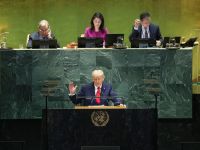Gulf oil exporters, bouyed by a rise in energy prices, should return to positive growth this year after suffering contractions in 1999, the International Monetary Fund predicted Tuesday.
The IMF also found that Gulf countries were pressing ahead with measures, adopted when sharply lower oil prices prevailed, to strengthen their non-oil private sectors.
The comments came in the latest edition of the IMF's World Economic Outlook report, which was released here ahead of meetings this week and next of IMF and World Bank policymakers.
The report foresaw growth of 3.5 percent in Saudi Arabia this year, after a one percent contraction in 1999, and 2.9 percent in 2001.
In Kuwait, which suffered negative growth of 2.4 percent in 1999, output should hit 3.6 percent this year and two percent in 2001. Saudi authorities have begun to restructure the telecommunications and utilities sectors to make them more attractive to private investment, while in Kuwait parliament has approved parts of a program aimed at giving the private sector a greater role in the economy.
In Iran, according to the IMF, expansion in output -- despite stronger revenues from oil prices -- has been hampered by structural distortions, unemployment and inflation.
But it said reforms are currently focused on encouraging private sector investment "as the primary source of growth and employment."
Annual growth is expected to slow this year in Egypt to five percent from six percent in 1999. In Israel, a "modest economic recovery" should pick up steam in the next two years, led by high technology exports.—AFP.
©--Agence France Presse.
© 2000 Mena Report (www.menareport.com)







